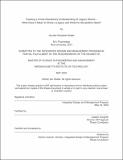Creating a Cross-Disciplinary Understanding of Legacy Stories – What Does It Mean to Share a Legacy and What Do Storytellers Need?
Author(s)
Shafer, Jennifer Elizabeth
DownloadThesis PDF (3.838Mb)
Advisor
Coughlin, Joseph
Terms of use
Metadata
Show full item recordAbstract
As people age, there is an increasing need to make meaning, reminisce, and pass on a legacy. While there are countless resources available to aid in the consolidation and transmission of the tangible, measurable legacy (e.g., through wills and estate planning), there are fewer resources to support the development of a cohesive emotional, personal legacy. Studies across healthcare, psychology, and sociology have demonstrated how reminiscence and life review can be effective tools in enhancing wellbeing as people age or approach end of life, but results are generally categorized by interventions and outputs rather than by the specific needs of the individual.
In this study a combination of survey, workshop, and interview techniques were used to better understand legacy storytelling. First, we focused on the perspective of older adults as they shared stories, advice, uncertainties, and formative experiences, resulting in 35 fundamental needs for storytellers. Next, we considered how experts in aging and intergenerational storytelling have developed programs that foster meaningful conversation. These interviews yielded 8 key design principles to empower loved ones and broader communities to kindle empathetic, inclusive, and productive dialogue. These principles seek to inform both the process of the storytelling experience, as well as the emotional journey of the participants. The foundation of legacy storytelling is the acknowledgement that our time is limited, and this work seeks to make this challenging topic more accessible.
Date issued
2022-05Department
System Design and Management Program.Publisher
Massachusetts Institute of Technology